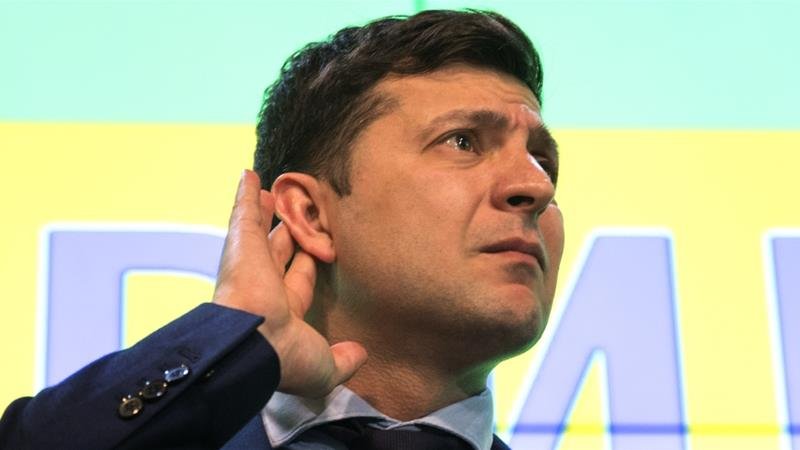A comedian as Ukraine’s next president? Looking at Zelensky’s policies

A comedian-turned-politician Zelensky is a strong favourite to win Ukrainian presidential run-off this coming Sunday, despite little being known about his political policies and plans.
That doesn’t seem to have discouraged voters so far with Zelensky winning the most votes (30.2%) in the first round of the election compared to current President Poroshenko, and his biggest rival, who got 16% of the vote in the first round.
One poll of just over 2,000 Ukrainians by the Kiev-based International Institute of Sociology (KIIS), said that 48.4% Ukrainian support Zelensky and 17% back Poroshenko while 17.9% remain undecided. Others intended to spoil their ballot paper didn’t intend to vote or refused to name their candidate.
Zelenksy might be a political novice but he’s no stranger to Ukrainians, having played the role of an ordinary guy that becomes Ukrainian president in a popular TV show called “Servant of the People.”
The KIIS survey explained, with 53.7% of respondents holding a positive attitude towards Zelensky, compared to 18.1% for President Poroshenko.
After turning toward politics in the real world, ‘Ze’ (like his TV character) posited himself as an anti-graft candidate struggling for a change in a country dogged by corruption, separatism and economic instability.
Critics know little about his plans for Ukraine if, as expected, he wins the run-off vote on April 21.
What does Zelensky actually say?
With his background as a comedian and actor, he knows how to woo an audience and the 41-year old has certainly used social media as a good tool in his election campaigning. This has enabled him to attract young Ukrainians who are disaffected with the political establishment under Poroshenko.
Old voters too are fed up at a lack of progress on tackling corruption and see Zelensky as a breath of fresh air.
Introducing himself on his website, Zelensky (‘Ze’ as he is known) says his goal is to “make people happier in Ukraine. I want to see happy faces around.” A pre-election program on his website, while lacking details, signals the moves he could make if elected.
Suggesting a digital push, Ze’s program affirms that he wants to see a Ukraine “where one can open a business in an hour, get a passport in 15 minutes, and vote in elections – in a second, on the Internet.”
Without offering considerable details, the comedian-turned-politician also alludes to wanting to boost employment, provide housing for young families, tackle corruption and nepotism, and improve wages and pensions, these all are the common problems faced by the Ukrainians
He notes, and says that the state should exist for Man, “not Man for the state.” His first task as the Ukrainian president would be to empower the people through referendums “and other methods of direct democracy”.
He says he wants to reform justice and equality in Ukraine and has gone so far as to say that he wants to eliminate parliamentary immunity from prosecution and would reform the judicial system.
Change of scenery
Despite critics saying that Zelensky’s plans are not that well detailed and that implementation could prove tricky, it has been noted that he has encircled himself with experienced advisers. The former finance and economy ministers have joined by his side, for example, and are likely to take ministerial posts once again if he wins.
Former Finance Minister Danyliuk (who could be in the eyeing for foreign minister) said that if Zelensky wins the election, his team will not include officials or ministers from the current administration.
Viktor Andrusiv, executive director of the Ukrainian Institute for the Future based in Kiev, said Zelensky’s plan was being criticized somewhat unjustly.
“He has collected top experts, economists and reformers around him and I would say his program looks quite good,” Andrusiv told American media CNBC Wednesday.
“There are a lot of liberal strategies to the economy and business as well as the pledge to abolish immunity for deputies (members of parliament) — a lot of oligarchs use the association of parliament as a way to avoid prosecution so this would change if he cancels this.”
Kremlin Factor
Ukraine is a country sandwiched between Russia and NATO members, and it harbors aspirations to join the EU and NATO — ambitions that have offended its big neighbour Russia.
Relations between two neighbours hit a new low in 2014 when Russia annexed Crimea from Ukraine and supported a pro-Russian uprising in eastern Ukraine, with the conflict in Donbass (where there are two self-styled republics of Donetsk and Lugansk, held by pro-Russian separatists) unresolved.
According to a United Nations estimates, 13,000 people have been killed, and 30,000 injured, in Donbass only since 2014.
Zelensky has said he supports dialogue with Russia and that “we must win peace for Ukraine” but said he would seek international support for Ukraine to see the restoration of “temporarily occupied territories and forcing the ‘aggressor’ to reimburse the damage. The portrayal of national interests and territories cannot be the subject of any negotiations.”
Economy
Ukraine’s conflict with Kremlin couldn’t have come at a worse time and in 2014 when the country was in bankruptcy and its financial sector under significant pressure the country was forced to ask IMF for financial aid.
IMF granted a $17.5 billion aid package in 2015 but it had stern conditions attached, including implementing a reform program designed to enhance financial stability, reduce a fiscal deficit, eliminate losses in the energy sector, tackle corruption and reform governance.
The aid program did not go completely smoothly with the IMF delaying the release of aid in early 2017 due to the slow pace of reforms — increasing household gas prices being one of the main bones of contention.
Kiev received a further $3.9 billion IMF credit line in December 2018 to get it through a potentially tumultuous political year with the presidential and parliamentary elections due in October this year.


















